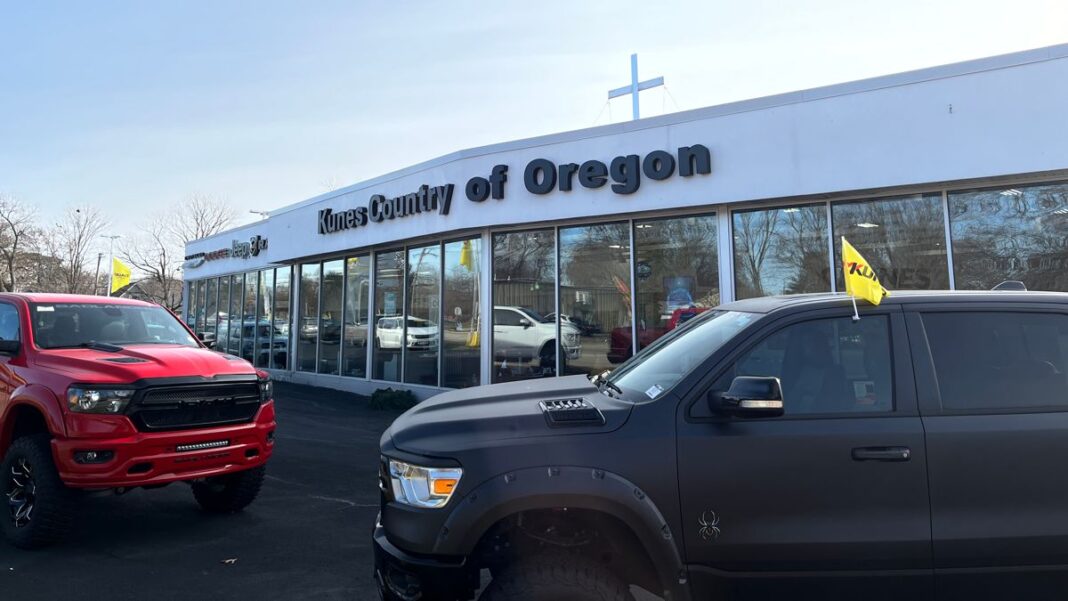There is an old expression, “You can lead a horse to water but you can’t make him drink.”
This expression should have been learned by AOC and Joe Biden before trying to mandate their supposedly green electric vehicles on every American driver. Now, just like the horse that wasn’t thirsty, American car customers are beginning to balk. Unfortunately, this won’t hurt our Washington, D.C. politicians as much as it will impact the entire automotive industry around the world. For the auto industry wrongfully led down this New Green Deal path it is a sink or swim moment.
Reports came out this summer that car dealers were beginning to inform their auto manufacturers that they have too many electric vehicles in stock and they are cutting back future orders until their current inventory is sold down. This news was not related to specific geographic areas of the country or vehicles by brand but was universal.
In the Midwest there is a family who has been growing their holdings of dealerships in Illinois, Wisconsin, Iowa, and Minnesota by leaps and bounds. Gregg Kunes, President & Owner of the Kunes Auto Group, grew up in Oak Lawn, Illinois in a large Christian family, and started his career in his father’s car dealership.
They now hold over 40 different dealerships in these four states. I bought my 2020 Jeep at one of their Illinois dealerships and my wife bought her 2022 Buick at one of their Wisconsin dealerships. We did so because of their service, reputation, and because they could get the specific vehicles with appointments we wanted.
Scott Kunes, Greg’s oldest son and Chief Operating Officer at Kunes Auto and RV Group, explained in a recent interview his company is turning away additional EV inventory. “We have turned away EV inventory. We need to ensure that we have a good turn on it,” he said to Business Insider. Kunes said that automakers are “asking us to make a large investment….and we’re just wanting to see some return on that.”
Sam Fiorani is Vice President of global vehicle forecasting at Auto Forecast Solutions. He recently outlined how EVs aren’t practical for many Americans as they would have to alter their lifestyle switching from a gas-powered car to an EV. “It’s not just that these vehicles are expensive — which they are. We’re talking about a much more nuanced lifestyle change,” Fiorani said. EVs obviously have a constrained range compared to gas-powered vehicles, and charging stations are few and far between at this moment in time.
EVs are more expensive than internal combustion engine-type cars, too. Earlier this year, before EV sales went south, Consumer Reports magazine/website showed the average sale price of an EV was over $61,000, or $12,000 more expensive than internal combustion models of the auto industry. Fiorani noted at that time “It’s hard for the average customer to make that leap while spending an extra $10,000.”
Another factor that seems to be impacting EV sales, besides their high price, are negative press stories such as the one this summer of a family trying to drive their new electric Ford F-150 from Winnipeg to Chicago (865 miles).
Family ditches electric truck on drive from Winnipeg to Chicago after charging troubles
That electric Ford pickup truck retailed for around $85 thousand and this particular customer was less than impressed when it did not live up to its price tag. Customer, Dalbir Bala, called electric vehicles the “biggest scam of modern times” after his experience ditching his new Ford F-150 Lightning for an internal combustion engine vehicle (ICEV) to finish his trip to Chicago.
The lesson learned this summer of 2023 for many seemingly has been EVs are not ready to replace the traditional reliable ICEV and there has been buyer’s remorse for all those who went woke buying EVs.
This has not deterred the politicians of some blue states to continue down the wrong path in the hoax of climate change. California announced it will ban the sale of new ICEVs by 2035. Their proposed mandates have drawn concern and criticisms from driving consumers, auto dealerships, and automakers alike.
EV sales figures for this summer have suggested consumers are starting to question the whole matter of climate crisis for reasons of personal practicality. The new EVs are inferior products to consumers use to ICEVs and the charging station infrastructure and time needed to charge an EV are big detractors from past habits of quick pit stops at prevalent gas stations.
News of what is going on in the minds of auto industry CEO’s has been breaking out all over the Internet as we offer some different YouTube video examples here:
Ford CEO Calls It Quits on EVs for These 5 Shocking Reasons!
GM CEO: “Our NEW Engine Will Destroy The Entire EV Industry!”
HUGE NEWS! Honda CEO Just SHUT DOWN EV Production!
HUGE NEWS! Toyota CEO SHOCKS All EV Makers!
Is This The END For Volkswagen? CEO’s WARNING Shocked The EV Industry!
Alternatives to the EVs currently on the market are being discussed and prototyped throughout the industry. Popular discussions involve alternatives to lithium-ion batteries offering longer ranges, to improved hybrids, and hydrogen fuel cell vehicles with a new infrastructure of hydrogen generating stations around the country. Time will tell but one thing is for sure, the current path we are on will not be followed.
Copyright © 2023 by Mark S. Schwendau










































